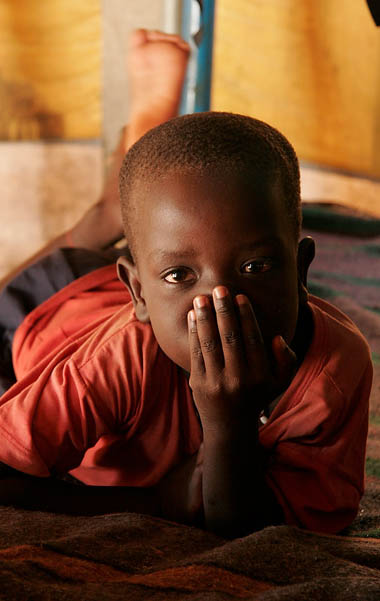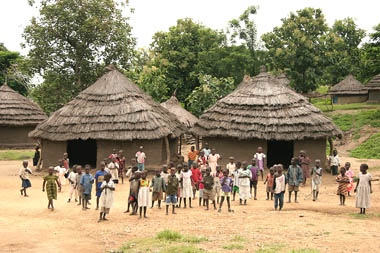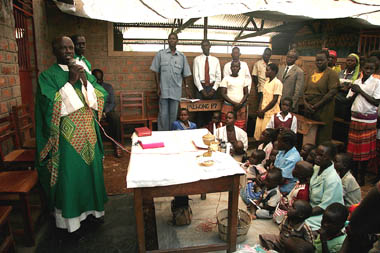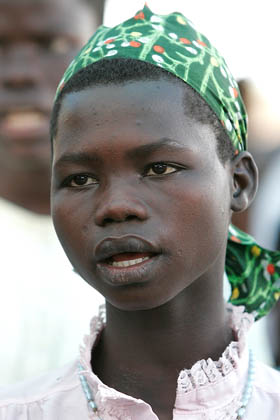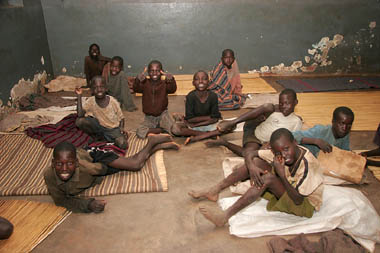Sharing the Graces of Reading
"They Come Back Singing"
The First Week of Lent
Gulu, Uganda - The Cathedral Parish run by Comboni Priests and Nuns have opened their grounds and buildings for the last seven years to "night commuters" children [and some women with babies] prime targets for rebels. |
Fr.
Gary reminded me this week of the significance of human relationships,
of "the richness of people." He describes the many situations
in which he is touched and touches those in the refugee community. So
many of the gifts exchanged in these encounters were unexpected, but
so meaningful in experiencing the love of God. .... Is it
because here human nature hasn't had time to disguise itself? Drew - Wayne, Pennsylvania, US Pp. 18-46: I closed the book after reading these pages overwhelmed with a range of emotions: terrible pain, intense sadness, and deep joy and freedom arising in me as Gary shed his own disguises. The retelling of one encounter after another drew me, pulled me like a magnet back to the person of Jesus. I too, with the young, terribly crippled boy, want to know Jesus. Yet, I said to myself, “I do know Jesus,” but quickly added, “not enough.” It’s an inexhaustible journey trying to take on the mind and heart of Jesus. Every day people enter my life whether physically or through stories such as these. For a moment I paused and thought of all those who were a part of my life this past week. . . I pray during the coming week for the grace to see and hear the opportunities each person in my life creates “for God to have a cleaner shot at my heart.” Jacquelyn SND, Ohio, USAThe imagery of the whole singing crowd walking Fr. Smith home was a very powerful one for me. He describes the irony of that situation, of being sent to lead people, and sort of discovering that you are indeed being led through the darkness yourself. I cannot think of a clearer sign of the presence of God in our lives than those moments. What a mysterious grace that brings the gifts of companionship and love out of suffering. This week especially I took from Fr. Gary’s words a renewed awe of one’s faith. During “A Mother’s Voice Crying Out in the Wilderness,” I felt a lot of guilty anxiety and wondered what I was doing at the moment that story took place. Was I in school? At a birthday party? This Lent I think I am asking for more mindfulness, to be more aware of the intersections of my life with the lives of everyone suffering far and near. Elena C., Chicago IllinoisThe
first week of Lent here in South Africa , has been as new as Fr.Garys
introduction to Uganda. Adusting to a new role...encountering new people,
new situations, new sounds, new smells. I was visiting a Parish in our
Diocese , one which I was not familiar with. It was the first visit
as the coordinator for the HIV/AIDs response within the Diocese. I started
my visit to the Parish , by first going to visit the sick. Why this,
well I wanted to see what it was like for the care givers in this Parish. Years ago a friend, who embraced Catholicism as an adult, told me of his reaction to a beautiful Easter vigil service. The liturgy was quite moving. But, he was disappointed leaving the church because there was little sign of joy among those who had just participated in the celebration of the great mystery of Christ’s Resurrection. “How is this possible?” he asked. In great contrast is Fr. Gary’s description of his Easter vigil celebration with refugees “in an achingly poor community”. They who have nothing in worldly possessions or security are able to treasure the gift of the Eucharist and celebrate Resurrection with great enthusiasm. After the service, they escort the priest to his compound through the dark night with the Easter candle and a lantern. All the while they are singing, clapping, and dancing. Lord, from the example of these courageous believers, may I learn never to take the gift of the Eucharist for granted. May I also become more willing to express outwardly the joy and light that Christ is in my life. Celia, Milton, MA USIn
relating his story Gary doesn't get caught up in wars, Uganda or the
Sudan or in Joseph Kony and the LRA. Instead Gary shares the richness
of the people and the joy that being among them brings to him. Though
he doesn't speak the language there he does struggle to rid his speech
of American idioms and metaphors. He is learning that the people are
grateful that he makes the effort and that he is there. Just his presence
as priest touches their hearts. Wherever Gary went it wasn't important
that he couldn't speak the language or didn't know all their customs
in various ceremonies from weddings to death and burial. In the midst
of his feelings of intimidation and inadequacy were not what was important.
His presence as priest anointed the occasion just as his being there
spoke of God to them. This truth slowly made its way inside his very
being. I am praying quietly for them as I do the various movements. They often fall asleep. I am asking for the grace to keep an open mind and simply allow God to speak in my heart as I move into retirement. Margaret R., Ft. Lauderdale, FloridaOne powerful image from the week: a rescued miner emerging from a cave-in, into the light of day, exhausted but joyous, "waving to the world." It's on p. 41, when Gary awakens and knows he is OK after his awful, frightening days of dysentery. The awful times in my life have been more psychological and more hidden, but I identify with the image. I have also known the truth that I am in God's hands at such times: something like "You have to be here with me. I have nothing else to hold onto." The difficulty -- and the grace I ask this Lent -- is that I have trouble trusting that this will be true for me in the future. Can I dare to hope that I will know, when I most need to, that "God is the benevolent and solicitous ground beneath me"? Betsy, Philadelphia PAFr. Smith recognizes the need to have mental, physical, emotional, and spiritual balance as well as well-being in one's life in order to be able to provide for the needs of others. He recognizes his own weaknesses and strives to overcome them but not obsessively so because as he says " I'm not here for me - I'm here for God". His prayer reflection causes one to reflect on the type of love I have for God! How would we answer Jesus' question of Peter - "Peter do you love me?" The suffering of these people displays once again, man's inhumanity to man - the presence of evil as evidenced all through out the history of the world. They however, shine with the light of faith! Their faith enables them to accept the conditions of their lives and to offer up their adversities to a loving God.Their childlike love of/trust in God is something we loose as we acquire "treasures".The more important these "treasures" become, the further away from the loving Father we move.What are my "treasures" and where do they lie? Where am I in my relationship with God? I need the grace to discern the path my life should take and the strength and courage to follow through. PGR, Green Cove Springs, FL USA“The Lord gives and the Lord takes away”…A simple theology that is a part of everyday life in every corner of our globe. How many times have we passively muttered that phrase in situations from sharing toys as children to being in the midst of winter snows and melting sunshine? The grace, to me, is to “find the holy” in situations of life and death; not only in the midst of civil and tribal wars, but also in events that strike closer to home. (In Illinois in the last two weeks there have been two well publicized tragedies in which 11 people have lost their lives to senseless gun violence.) We are so often left with more questions than answers, yet we know that our God is always there to sustain us. We pray to our generous and forgiving God to sustain those around the world affected by poverty, displacement, and desperation; all of these issues ingredients in a recipe that so often leads to violence as a reaction to seemingly hopeless situations. “…It is about not only accepting what cannot be changed, but also offering up adversity to the benevolent God. I see this attitude every day in the people here, but I myself am not very good at it.” I find the perseverance of Rebecca, Atibuni, the Easter people of Ocea, William, and the so many others (including Fr. Gary) such inspiring examples of the Body of Christ who do “find the holy” in their everyday lives. I pray for the courage to more fully place myself truly in God’s hands. Susan, South Holland, Illinois, USAfter agreeing
to read this book for Lent, and share reflections on it, I admit I was
a bit frightened by the prospect of going to the refugee camp with Gary.
I know that I can get overwhelmed at times with poverty and suffering
the seems so far beyond my control or even efforts to effect; perhaps
that's why it's easier to turn the newspaper page than to struggle to
understand. However, the golden thread of hope and joy comes through,
and my desire to experience it through this reading and reflection grows.
As I continue
to read, I am simply struck by the extreme poverty of the refugees and
the potential wretchedness of their situation. And yet there seems to
be a pure and holy joy among young and old that we lack in our U.S.
culture. Reading this during Lent causes me to think about the various
luxuries of our lives that we "give up" by choice during this
season. These refugees - and many like them around the world - do without
these and far greater things almost every single day of their lives. In the midst
of life we are in death. As Fr. Gary experienced births, baptisms, and
battles with his own mortality, he recognized the constant and unchanging
beneficence and solicitude of God's love. This love expressed itself
in the humbleness of a starving mother seeking milk, a destitute father
seeking a shroud, and a grieving husband seeking hope, all of whom sought
answers to heart felt prayers through God's earthly body: a priest/minister/servant,
known as Baba. Father Gary's
story continues to amaze and inspire me to look at my life. In our magazines,
newspapers and on TV we can learn about "celebs". The people
Father cared for are God's "celebs". I am developing a different
vision of my brothers and sisters. I watch the evening news with my
heart and evaluate the things I felt were necessities of life with a
different scale. My vision has been changed forever. The reflection
question asks what I am learning from Fr. Smith's struggle. I am learning
that the faces that I see on TV or in the newspapers relating to Africa
are the faces of real people who live in a third world country through
an "accident of birth" or, as I believe, through a Divine
Plan. It makes no sense for me to question this plan any more that I
can question why I was born into the family I was and in the place I
was. I am learning, too, that Fr. Gary has been answering God's call
throughout his life and that even in his struggles God is very present
to him. He is aware that only God's grace keeps him going on and he
is very honest in describing feelings of inadequacy. His love for the
people shines through as does his wonderful sense of humor and his ability
to laugh at himself. I tend to take myself too seriously and can be
very intense in living my spiritual life. I am sure that I have driven
more that one spiritual director a bit crazy. The images
that remain with me are of the country and the camp area named after
an eradicated animal. The country that seems so desolate, yet "home"
to so many refugees. The camps in the heat, the bugs, the dirt roads,
the difficult way to travel. Yet police where ever monies were to be
found. I identified with the diseases, diseases that could be so easily
eradicated through public health measures. And yet hope is here where
the children dance and sing. Is Fr Gary
introducing us to the mystics of the new millenium, the Mystics of the
Savannah? Should we look to them for answers and guidance about faith
in this new century? Fr Gary cites Matthew 11:25-26; the line that jumps
out to me is "...for hiding these things from the learned and the
clever and revealing them to mere children." Children. Were the
members of the congregation children, because of their age, their education,
or their willingness to accept something that is not intended to be
explained, it just is. In reading
Fr. Smith’s struggles I am realizing that we share a universal
struggle – the constant striving to be faithful, while at the
same time having to accept that we are human. Life is difficult and
the degree of difficulty depends on where and who you are. The suffering
in the lives of these wonderful people and their acceptance of what
life brings them puts my small difficulties into perspective. They just
go with the flow – something I find very hard to do. Dear Minga, Asega, Kenyi, Tuwanga, Otim, Luaatea and Lokuri: Do still people in the camps die of malaria? May be. This is my experience in India too. Every year thousands of people, particularly children die of malaria. Most of them are Adivasis (the people of the soil) / indigenous people. The world talks about HIV/AIDs and cancer as killer diseases and spends millions of dollars. But everyone has forgotten that even today thousands of people die of malaria in Africa and India. Is it because 'malaria is the killer disease of the poor'? I have got it once and I know the pain of it. I am happy Fr. Gary got it. Sharing your pain and suffering is a necessary condition to understand you. I want to know you more and journey with you. Pray that I may withstand all temptations, rationalisation and justification. That is the lesson you taught me and I am reliving my story with the Adivasis during this season of lent. Take care till we meet again. Joe Xavier, Bangalore, IndiaIllness. Illness can rule your life. Fr. Smith found out that the body can grow weak and you cannot completely ignore it. You may have the best intentions but dysentery can be very dangerous and you must treat it. St. Ignatius also found out that moderation is better. You can make yourself so sick you do no one any good. Thomas Merton did the same thing. In order to do your work and really help others you cannot ignore your own health. I became aware of my own weakness as I fought a cold this week and tried top keep up with my work at the same time. Sometimes you have to admit that you are human. What’s in a name? The importance of choosing a name struck me as my youngest son is preparing for Confirmation and is starting to consider different names. Whichever name you choose shows what you value and are striving for. The refugees spend quite a bit of time deciding what name to live up to. It is a sacred duty to choose well. Steve in OmahaWhat to address first? Certainly the darkness in the bush is something to experience. To be so surrounded by that kind of blackness, that you have no relationship to anything, except for its sound. No shapes seen, but knowing bodies sway around you, like guiding angels. You, who was the leader, now a stumbling follower. Better than any trust walk you will ever experience. I was also taken with the story of the woman, who could not feed her child. I watch my ganddaughter nursing until she is full and wonder at the frustration of the mother and child in Gary's story. But I have seen the breasts of nursing mothers during a drought. When they cannot find enough fluid for their own bodies, much less enough to produce milk for their child. Their eyes are filled with despair, as their child lies listless in their arms. I think that I was most taken by the stories of the beggars. They are everywhere in Africa. Every kind of human disability is seen on the streets, heads bowed and any available container for coins sitting beside them. I remember a story of a boy with club feet. The doctor, my traveling companion, said that he saw the face of God in this boy and knew that he could surgically repair his feet. As he approached, the boy ran on his ankles trying to escape. The doctor chased him, until he was stopped by a man taking in the scene. He told the doctor to stop chasing him. The boy does not want his help. He will take in more money begging with the disability than without it. One boy's reality is the doctor's shattered vision. Nancy In the midst of
life we are in death. As Fr. Gary experienced births, baptisms, and
battles with his own mortality, he recognized the constant and unchanging
beneficence and solicitude of God's love. This love expressed itself
in the humbleness of a starving mother seeking milk, a destitute father
seeking a shroud, and a grieving husband seeking hope, all of whom sought
answers to heart felt prayers through God's earthly body: a priest/minister/servant,
known as Baba. Father Gary's story continues to amaze and inspire me to look at my life. In our magazines, newspapers and on TV we can learn about "celebs". The people Father cared for are God's "celebs". I am developing a different vision of my brothers and sisters. I watch the evening news with my heart and evaluate the things I felt were necessities of life with a different scale. My vision has been changed forever. The story about lighting the Easter fire brought back memories of an occasion when I was on retreat. We were outside trying to light the fire on a windy night. After seversl attempte and many prayers we were successful. What a prayerfulnight that was! Father Smith's nighttime sight of the fireflies grazing on the grass of his roof reminded me that God prepares wonderful surprises for us, if only we would open our eyes and ears to them. We have to be alert and tuned into his world and people inorder to see and appreciate what he is giving us. I have to turn my vision from my narrow world to God's world and his people. Mary from Joliet, IL, USA The reflection
question asks what I am learning from Fr. Smith's struggle. I am learning
that the faces that I see on TV or in the newspapers relating to Africa
are the faces of real people who live in a third world country through
an "accident of birth" or, as I believe, through a Divine
Plan. It makes no sense for me to question this plan any more that I
can question why I was born into the family I was and in the place I
was. I am learning, too, that Fr. Gary has been answering God's call
throughout his life and that even in his struggles God is very present
to him. He is aware that only God's grace keeps him going on and he
is very honest in describing feelings of inadequacy. His love for the
people shines through as does his wonderful sense of humor and his ability
to laugh at himself. I tend to take myself too seriously and can be
very intense in living my spiritual life. I am sure that I have driven
more that one spiritual director a bit crazy. The images that remain with me are of the country and the camp area named after an eradicated animal. The country that seems so desolate, yet "home" to so many refugees. The camps in the heat, the bugs, the dirt roads, the difficult way to travel. Yet police where ever monies were to be found. I identified with the diseases, diseases that could be so easily eradicated through public health measures. And yet hope is here where the children dance and sing. The main person at this point is the writer, who for some reason I envisioned as a young man. Some how I missed the fact that he was a priest for 30 years. I identified with the woman walking with her husband and children and the chicken. How quickly life can change with a "flash." How considerate of the writer to cover the husband with his blanket and to travel hours to bring the family and body to their village where they would be cared for and comforted. How profound that the writer repeatedly says that he experiences the absence of loved ones and at the same time so identifies with the Eucharist and how he through the Eucharist will transform the situation that he is in. How gifted I am. How taken for granted is my daily bread. I ask for the grace to identify with the Eucharist as a transforming agent of His will and that I come to know what that is and will have the grace to accept it and live it. Carol - Burlington Massachusetts USA Is Fr Gary introducing us to the mystics of the new millenium, the Mystics of the Savannah? Should we look to them for answers and guidance about faith in this new century? Fr Gary cites Matthew 11:25-26; the line that jumps out to me is "...for hiding these things from the learned and the clever and revealing them to mere children." Children. Were the members of the congregation children, because of their age, their education, or their willingness to accept something that is not intended to be explained, it just is. Last night I attended a meeting for parents whose children are preparing for their first reconcilliation, and first communion. Father was trying to explain what the children would be experiencing and going through. He asked a series of questions meant to elicit responses and involve us much the same way Fr Gary asked questions after the Easter Vigil. His audience sat stone faced, and unresponsive. Was it because we knew the answers, and didn't want to seem foolish in responding to what many though was a childish activity, or something else? Were we too "learned and clever" to participate?Finally, it struck me that he described them as dancing, singing and clapping in order to banish the night. I don't think they were banishing the night, only the accompanying darkness. The darkness brought about by the terror the likes of Joseph Kony were imposing on these brave, resilient people. They were telling Kony, "Here we are Devil, and we do not fear you because God is with us and HE is our savior, not you." Kony introduces a whole other factor to the equation of who these people are, and why they are the way they are. I'm not ready to address him yet. My blood boils, and my hands shake with anger and rage, not fear, when I think of him and what he is doing. I rage at him because of what he is doing to these people, and that he is trying to claim he is being guided by God. Not just any god, he is trying to claim my God, and he can not have him. Larry -- San Jose, California, US In reading Fr. Smith’s struggles I am realizing that we share a universal struggle – the constant striving to be faithful, while at the same time having to accept that we are human. Life is difficult and the degree of difficulty depends on where and who you are. The suffering in the lives of these wonderful people and their acceptance of what life brings them puts my small difficulties into perspective. They just go with the flow – something I find very hard to do. I hear the call to go deeper within and allow God’s healing love to touch the hurts and pains of my past and to let go of all the loss. My prayer this Lent is to be given the grace to trust God as readily and easily as these people do. Rita - Allentown, Pennsylvania, US Dear Minga, Asega, Kenyi, Tuwanga, Otim, Luaatea and Lokuri: Do still people in the camps die of malaria? May be. This is my experience in India too. Every year thousands of people, particularly children die of malaria. Most of them are Adivasis (the people of the soil) / indigenous people. The world talks about HIV/AIDs and cancer as killer diseases and spends millions of dollors. But everyone has forgotten that even today thousands of people die of malaria in Africa and India. Is it because 'malaria is the killer disease of the poor'? I have got it once and I know the pain of it. I am happy Fr. Gary got it. Sharing your pain and suffering is a necessary condition to understand you. I want to know you more and journey with you. Pray that I may withstand all temptations, rationalisation and justification. That is the lesson you taught me and I am reliving my story with the Adivasis during this season of lent. Take care till we meet again. Joe Xavier, Bangalore, India Illness. Illness can rule your life. Fr. Smith found out that the body can grow weak and you cannot completely ignore it. You may have the best intentions but dysentery can be very dangerous and you must treat it. St. Ignatius also found out that moderation is better. You can make yourself so sick you do no one any good. Thomas Merton did the same thing. In order to do your work and really help others you cannot ignore your own health. I became aware of my own weakness as I fought a cold this week and tried top keep up with my work at the same time. Sometimes you have to admit that you are human. What’s in a name? The importance of choosing a name struck me as my youngest son is preparing for Confirmation and is starting to consider different names. Whichever name you choose shows what you value and are striving for. The refugees spend quite a bit of time deciding what name to live up to. It is a sacred duty to choose well. Steve in OmahaWhat to
address first? Certainly the darkness in the bush is something to experience.
To be so surrounded by that kind of blackness, that you have no relationship
to anything, except for its sound. No shapes seen, but knowing bodies
sway around you, like guiding angels. You, who was the leader, now a
stumbling follower. Better than any trust walk you will ever experience. |
Lent with Refugees Home Page | Praying Lent Home Page | Creighton U. Online Ministry Home Page
